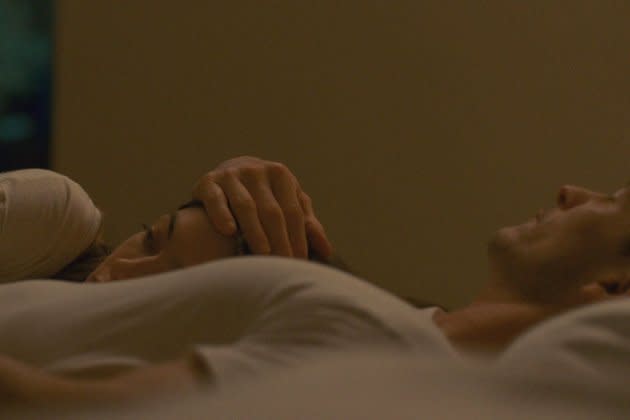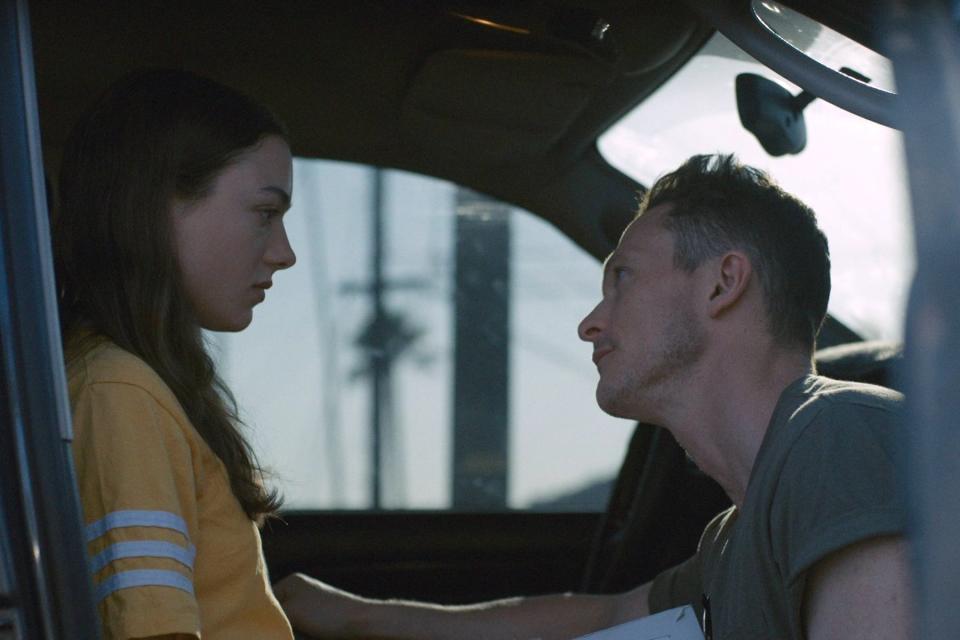Inside the Most Disturbing Movie of the Year (So Far)

Lea feels lost. It is the summer before her senior year of high school, and the 17-year-old’s days are spent watching online makeup tutorials and reality TV, playing games on her phone, and lounging under the Southern California sun. Her father walked out years ago, and her boozy mother (Gretchen Mol) is needy when she’s single and distant when she’s not. She can’t relate to her teenage friends, who seem in thrall to emotionally stunted neighborhood boys their own age, laughing at their puerile jokes and observations, and succumbing to their clumsy sexual advances.
Enter Tom. After skipping out on their diner bill, Lea is accosted by the chef, who gets physical with her. Tom steps in, upbraiding the older man for striking a girl. To Lea, Tom feels like a breath of fresh air. He’s a good listener, attentive to her wants and needs. Possessed of a rugged masculinity. The last boy she saw pumped away at her in the back of his car; Tom, on the other hand, will lay beside her in the back of his pickup truck and look at the stars. But Tom is 34, or twice her age, which makes him predatory. Lea knows this, as do her friends, but the more they chastise her for the inappropriate relationship, the more she clings to him. And Tom uses her precariousness to his advantage.
More from Rolling Stone
A Terrifying Tale of a Teenage Girl Groomed Into Being Sex Trafficked
Tennessee Ex-Cop Sues After Becoming Porn Meme, Claims She Was 'Groomed' for Sex With Coworkers
“You’re mine, right?” Tom asks her, adding, “You’re never gonna leave me. Because nobody loves you the way that I love you.”
Lea and Tom, played to perfection by newcomer Lily McInerny and Jonathan Tucker, are at the center of Palm Trees and Power Lines, the hauntingly powerful feature directorial debut of Jamie Dack. The film, which premiered at the 2022 Sundance Film Festival (earning her a directing award), garnered four Independent Spirit Award nominations, and is out now in select theaters and VOD, traces how Tom grooms Lea into becoming first his lover, then his property, trafficking her to another man in a seedy motel room not unlike the one he lives in.

Dack, who adapted the film from her 2018 short, based both on a past relationship she had as a 17-year-old with a man in his early 30s.
“I was 17 at the time and he was in his early 30s, and it was not a relationship like Tom and Lea’s. I used Lea as a proxy for my younger self as I explored what could have gone wrong if that had been this man’s intentions,” she tells Rolling Stone. “That was when I wrote the script to follow the stages of grooming and focus on the power dynamics at play, and the manipulation. I was following these certain stages: targeting a victim, gaining their trust, filling a need, isolating them, and then the abuse begins.”
To prepare for the feature, Dack met with a real-life sex-trafficking survivor and read a number of survivors’ stories. She was also inspired by the #MeToo movement, which crested while she was writing the screenplay. It not only gave her “a little pat on the shoulder that encouraged me to keep writing,” but also made her reevaluate that past relationship.
“Sometimes we can go through life and think things are normal and not give them much thought, and then someone says something, or something happens, and there’s a shift,” she explains. “It provided a new lens I was looking through. You hear people sharing their own stories and you start to examine you own — and maybe you never have before.”
She calls that relationship “a mixed memory” since it “was not all bad by any means,” but found the writing process “therapeutic.” Screenings have also prompted audience members at Sundance and beyond to share their stories with Dack, which has affected how she’s processed her own experience.
Casting the feature proved difficult. It was important for Dack to find a young, unseasoned actor for the role of Lea and a more veteran performer for Tom. Casting director Kate Antognini stumbled upon an audition tape from McInerny, who had never acted before, and Dack could not stop thinking about it. Though McInerny was 21 when they shot the film, she looks several years younger, which makes the film feel frighteningly realistic — unlike all those projects these days where twenty and thirty-year-olds portray high schoolers.
“That really takes me out of it,” she says. “It feels so false to me when I’m watching TV or films that have that in the casting, and I very consciously decided that she was going to be under 18, so I needed her to look that age. I know it’s disturbing, but that’s the point. If you’re watching actual teenagers who look like their age have sex on a show, that’s completely different than having actors in their twenties and thirties. It’s a lot more disturbing.”
Finding her Tom proved more trying, since many actors balked at embodying such a despicable character, but Tucker — whose role as an MMA fighter in Kingdom impressed her — bravely answered the call.
Dack wanted Palm Trees and Power Lines to subtly, and meticulously, guide audiences through the stages of grooming and not devolve into a cartoonish portrait of sex trafficking like so many Hollywood films have.
“There’s Taken, so that people think trafficking is someone being thrown into the back of a van and don’t realize it can be done with no physical violence and subtle grooming and manipulation,” she says.
She also didn’t want it to be gratuitous, pointing to the “unbearable” rape sequence in Gaspar Noé’s Irréversible as something she was actively trying to avoid. There is no nudity or blood in Dack’s film, yet it’s psychologically graphic because of its painstaking detail, and because we are trapped in Lea’s perspective.
“I could see that I was making choices that a male director wouldn’t have made,” she maintains. “And yet people were so disturbed by my film. I understand it’s disturbing, but there were also times where I thought, all I’m doing is putting you in the perspective of this teenage girl and for some reason you can’t handle it. Others have done similar scenes to the most disturbing scene in my film and been a lot more violent and graphic, and people tolerate it differently. It’s interesting.”

The “disturbing scene” she’s referring to occurs in the third act, and it’s indeed one of the more horrifying scenes in recent memory. After Tom inspects Lea with the blinds open, and orders her to perform oral sex on him, he tells her that another man will be coming to the room to have sex with her.
“You told me to take care of you. This is how I would take care of you,” he says, twisted her words against her.
Dack and her actors spent a day shooting the scene, which was initially shot in a continuous 10-minute take. The version that made the film is considerably shorter but feels endless. We see a much older man enter the room. Lea is terrified. He talks her off the ledge, before placing her hand on his crotch. Then, he has sex with her. The camera moves in on her face, and then the room’s smoke alarm, which Lea focuses on as she disassociates. A single tear travels down her face.
“What so powerful about that shot is, of course there’s Lily’s tear, but it’s not an extreme close-up where we just see her face,” Dack explains. “It shows part of her clothed body and his hands and his head are coming in and out of frame.”
She pauses. “People are disturbed by being in her perspective, and for that scene we place the camera outside of her perspective for that wide shot. Sometimes what you hear behind a closed door is more disturbing than seeing it versus being up-close and graphic. It plays out in real time and doesn’t cut.”
Since this is McInerny’s first film, Dack says she did everything she could to make sure her young star was comfortable shooting the sequence.
“The most important thing was developing my relationship with Lily — one of trust and open communication, especially around the more delicate scenes,” says Dack. “If Lily had any issue at any moment, I knew she could say something about it. Even though that one scene wasn’t with Jonathan, him being on set that day was helpful. And her scene partner that day was amazing. When I was auditioning that person for that role, I was looking for their performance first and foremost, but also if they gave me any impression of them not being professional.”
Dack is currently writing two features — one is an original idea, and the other is an adaptation of “an Italian novella written in 1947” that she optioned. She hopes audiences will connect with Palm Trees and Power Lines and, in some cases, feel seen.
“I think all sorts of stories need to be told — even ones that scare people and feel taboo,” she says. “People have related to it, and it’s important for people to see their stories on screen and not just sit with it on their own with internalized guilt and shame.”
Best of Rolling Stone

